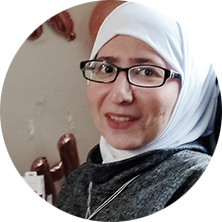But when you face daily examples of people struggling to obtain the basic necessities in life how do you maintain your own optimism? It is not always easy.
Nouma Hammash is all too familiar with the systemic gaps that prevent people with disabilities from living to their full potential. An ardent social worker by background with an interest in social justice and equity, she has been a Regional Services Coordinator (RSC) for SCIO since 2019. In her role she helps clients navigate the system and find programs and services that can help them.
“Sometimes, clients call in distress and they are feeling overwhelmed. We try to empower them to advocate for themselves, but we understand it can be difficult and are ready to step in to help…”
-Nouma Hammash
“A typical day involves a ton of emails, contacting government agencies with or on behalf of clients such as Canada Revenue Agency, Service Canada and so forth. We help a lot with application processes and third party agencies like accessing food banks and accessible health care clinics,” she shares. “Funding resources are huge for our community, so a lot of the time, we are helping to fill the gap for equipment through programs like our Equipment for Independence at SCIO and we foster relationships with other community services while working closely with clients’ rehab teams so that they can be set up for optimal success.”
Nouma shares that a big focus of her role in the last two years has been around helping her clients to save money. “With inflation, it hasn’t been easy for people with disabilities, especially those on a fixed income, but we try to help point them to resources in the community,” she says. With lived disability experience herself, she says that the sense of familiarity with barriers she has had to face herself helps to build rapport with clients.
“Sometimes, clients call in distress and they are feeling overwhelmed. We try to empower them to advocate for themselves, but we understand it can be difficult and are ready to step in to help,” she says.
For Nouma, the biggest challenge of her role is that so many issues are out of her hands and are dependent on government action to improve community supports. “We see so many people struggling with basic human dignity. For instance, the challenges in maintaining attendant services which affect personal care or the ability to eat properly,” she shares, “And that impacts us on a personal level. It leads to frustration and thinking about those clients when we are accessing the very things they are struggling to gain access to.”
When it comes to managing her mental health on those difficult days, Nouma shares that she gains motivation and inspiration from the resilience of her clients who demonstrate patience and understanding so much of the time. She also raves about coworker support at SCIO and the ability to lean on her team members to vent, share resources and just be there for one another in challenging times. “We support each other as we work to support our clients,” says Nouma.
“Talking about the mental health of frontline workers is beneficial because it allows the discussion to open up and create more opportunities for a supportive workplace,” she shares. “I lean a lot on meditation, prayer, nature and spending time with my new niece who is a source of joy and therapy for me. Moreover, as an organization and a community, we learn a lot about each other from how we work and what we do. Every team matters and we simply cannot do it without each other.”
Nouma shares that although COVID has made many things more difficult and darker than it was before, there is still light out there and plenty of opportunity to make someone’s life just a little bit better.







